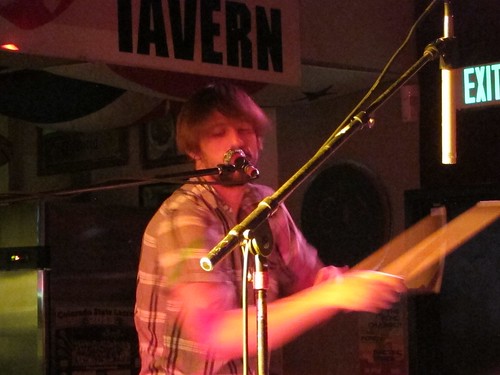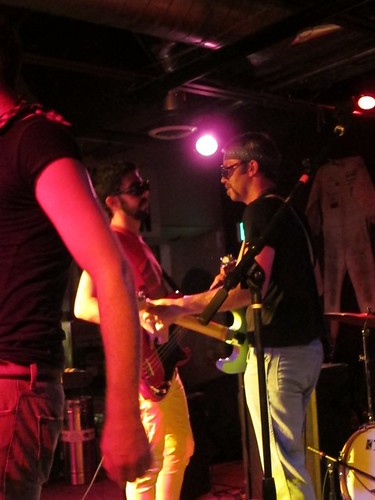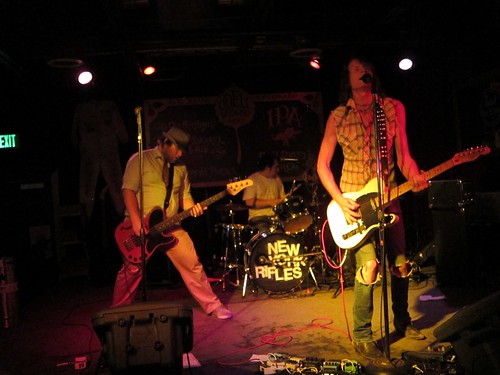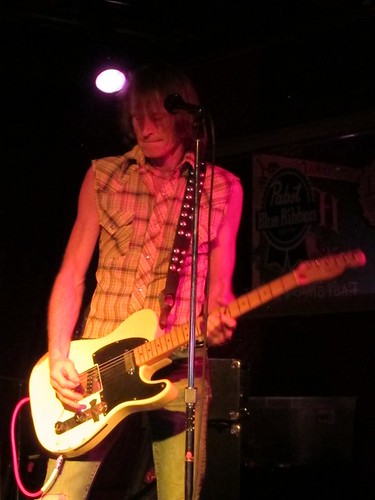Band versions of singer-songwriter material, but punctuated with perfect lyrical moments
 Mark Mulcahy and his band Miracle Legion made a small splash on the college rock scene back in the 1980s. They developed a small coterie of dedicated fans and opened for a number of well-known bands, but their most lasting ripple in the national consciousness was when they reformed as Polaris to do music for the 1990s Nickelodeon series “The Adventures of Pete & Pete”. After the show was canceled, Mulcahy continued as a solo artist, still opening for larger acts and releasing the occasional stripped down album. He patiently recorded his latest project, Dear Mark J. Mulcahy, I Love You, over the course of a year, with a rotating cast of friends backing him. Just like his Miracle Legion days, he still writes a very catchy tune, but these songs feel like they were intended to be solo singer/songwriter pieces. His ever-present acoustic guitar keeps one foot in that space even as the tracks are scaled up by his band buddies. The resulting album is almost a period piece, channeling early ‘90s indie rock and evoking artists like Dada and Michael Penn.
Mark Mulcahy and his band Miracle Legion made a small splash on the college rock scene back in the 1980s. They developed a small coterie of dedicated fans and opened for a number of well-known bands, but their most lasting ripple in the national consciousness was when they reformed as Polaris to do music for the 1990s Nickelodeon series “The Adventures of Pete & Pete”. After the show was canceled, Mulcahy continued as a solo artist, still opening for larger acts and releasing the occasional stripped down album. He patiently recorded his latest project, Dear Mark J. Mulcahy, I Love You, over the course of a year, with a rotating cast of friends backing him. Just like his Miracle Legion days, he still writes a very catchy tune, but these songs feel like they were intended to be solo singer/songwriter pieces. His ever-present acoustic guitar keeps one foot in that space even as the tracks are scaled up by his band buddies. The resulting album is almost a period piece, channeling early ‘90s indie rock and evoking artists like Dada and Michael Penn.
The first single, “She Makes the World Turn Backwards” (non-album version), is easily the album’s strongest track. While the title and chorus music rework various snippets of Roky Erickson’s garage psychedelia, the verses have a fatalistic desperation borrowed from Penn’s sophomore album, Free-for-All (1992). Mulcahy captures the same mix of acoustic guitar and bass decorated with tripped out electric guitar fills. His relaxed vocal phrasing also echoes Penn’s, with off-beat pauses that oddly emphasize particular words. The call-and-response section of the chorus, “Where does it hurt?/ Everywhere!,” is heavy-handed, but the piece is powerful enough to overcome the melodrama.
This collection of songs reflects the loosely directed flow of the recording sessions; each of the 11 tracks stands alone, without any real relationship to the others. This juxtaposes the strained surrealism of the Pavement-like “Let the Fireflies Fly Away” with the stripped down synthpop of “Bailing Out on Everything Again” and the Tom Petty Americana of “Poison Candy Heart”. Despite the odd transitions, Mulcahy consistently throws out lines that stick. Deceptively simple, it’s immensely satisfying to savor lines like, “Creeping toward the end/ Waiting on my man/ All I can do is what I do best/ And that’s taketh away” (“I Taketh Away”) and “You’re happiest when I’m not/ I can live with that” (“Poison Candy Heart”).
Sometimes, like on the Dylanesque “He’s a Magnet”, the initial lyrics promise more than the song can deliver, in this case opening with, “It all starts with the alphabet/ ‘A’ is for all I can get” before drifting into a mishmash of disjointed ideas, from Bible-readers to the cliché that “…weed will get you through times of no money.” But it’s a good-natured, drunkard’s walk and the closing assertion that “I’m positive we’re the ones that we’ve been waiting for” somehow wraps the song up with a non-Euclidean bow. On the other hand, “The Rabbit” is near perfect as it sketches out a tale of codependence, but for all his cynicism about his lover’s motivations and ambivalence about their dysfunctional relationship, Mulcahy tags the chorus with desperate longing.
Over the years, Mulcahy has collected a core of well-known supporters, like Thom Yorke, Dinosaur Jr. and Michael Stipe. They even pulled together a benefit/tribute album, Ciao My Shining Star (2009), to raise money for Mulcahy and his two daughters following his wife’s sudden death. His scattered fans will undoubtedly embrace Dear Mark J. Mulcahy, I Love You and its return to something more like Miracle Legion’s sound. Hopefully, the album will swell their ranks.
(This review first appeared on Spectrum Culture)
 Mark Mulcahy and his band Miracle Legion made a small splash on the college rock scene back in the 1980s. They developed a small coterie of dedicated fans and opened for a number of well-known bands, but their most lasting ripple in the national consciousness was when they reformed as Polaris to do music for the 1990s Nickelodeon series “The Adventures of Pete & Pete”. After the show was canceled, Mulcahy continued as a solo artist, still opening for larger acts and releasing the occasional stripped down album. He patiently recorded his latest project, Dear Mark J. Mulcahy, I Love You, over the course of a year, with a rotating cast of friends backing him. Just like his Miracle Legion days, he still writes a very catchy tune, but these songs feel like they were intended to be solo singer/songwriter pieces. His ever-present acoustic guitar keeps one foot in that space even as the tracks are scaled up by his band buddies. The resulting album is almost a period piece, channeling early ‘90s indie rock and evoking artists like Dada and Michael Penn.
Mark Mulcahy and his band Miracle Legion made a small splash on the college rock scene back in the 1980s. They developed a small coterie of dedicated fans and opened for a number of well-known bands, but their most lasting ripple in the national consciousness was when they reformed as Polaris to do music for the 1990s Nickelodeon series “The Adventures of Pete & Pete”. After the show was canceled, Mulcahy continued as a solo artist, still opening for larger acts and releasing the occasional stripped down album. He patiently recorded his latest project, Dear Mark J. Mulcahy, I Love You, over the course of a year, with a rotating cast of friends backing him. Just like his Miracle Legion days, he still writes a very catchy tune, but these songs feel like they were intended to be solo singer/songwriter pieces. His ever-present acoustic guitar keeps one foot in that space even as the tracks are scaled up by his band buddies. The resulting album is almost a period piece, channeling early ‘90s indie rock and evoking artists like Dada and Michael Penn.
The first single, “She Makes the World Turn Backwards” (non-album version), is easily the album’s strongest track. While the title and chorus music rework various snippets of Roky Erickson’s garage psychedelia, the verses have a fatalistic desperation borrowed from Penn’s sophomore album, Free-for-All (1992). Mulcahy captures the same mix of acoustic guitar and bass decorated with tripped out electric guitar fills. His relaxed vocal phrasing also echoes Penn’s, with off-beat pauses that oddly emphasize particular words. The call-and-response section of the chorus, “Where does it hurt?/ Everywhere!,” is heavy-handed, but the piece is powerful enough to overcome the melodrama.
This collection of songs reflects the loosely directed flow of the recording sessions; each of the 11 tracks stands alone, without any real relationship to the others. This juxtaposes the strained surrealism of the Pavement-like “Let the Fireflies Fly Away” with the stripped down synthpop of “Bailing Out on Everything Again” and the Tom Petty Americana of “Poison Candy Heart”. Despite the odd transitions, Mulcahy consistently throws out lines that stick. Deceptively simple, it’s immensely satisfying to savor lines like, “Creeping toward the end/ Waiting on my man/ All I can do is what I do best/ And that’s taketh away” (“I Taketh Away”) and “You’re happiest when I’m not/ I can live with that” (“Poison Candy Heart”).
Sometimes, like on the Dylanesque “He’s a Magnet”, the initial lyrics promise more than the song can deliver, in this case opening with, “It all starts with the alphabet/ ‘A’ is for all I can get” before drifting into a mishmash of disjointed ideas, from Bible-readers to the cliché that “…weed will get you through times of no money.” But it’s a good-natured, drunkard’s walk and the closing assertion that “I’m positive we’re the ones that we’ve been waiting for” somehow wraps the song up with a non-Euclidean bow. On the other hand, “The Rabbit” is near perfect as it sketches out a tale of codependence, but for all his cynicism about his lover’s motivations and ambivalence about their dysfunctional relationship, Mulcahy tags the chorus with desperate longing.
Over the years, Mulcahy has collected a core of well-known supporters, like Thom Yorke, Dinosaur Jr. and Michael Stipe. They even pulled together a benefit/tribute album, Ciao My Shining Star (2009), to raise money for Mulcahy and his two daughters following his wife’s sudden death. His scattered fans will undoubtedly embrace Dear Mark J. Mulcahy, I Love You and its return to something more like Miracle Legion’s sound. Hopefully, the album will swell their ranks.
(This review first appeared on Spectrum Culture)
 The world craves biographies of celebrities who died too young. We look for closure on open questions and missing details. The longer-lived stars, the survivors, only intrigue us if they fall into one of two categories: the enigmas and the outrageous. Leonard Cohen easily fits into the former group. Rather than tell his own story, he prefers to define himself through the ambiguity of his imperfect poems and songs. But Cohen belongs in the latter group as well, due to his nomadic romantic life and improbable ties to a host of wild characters like Bob Dylan, Andy Warhol, Janis Joplin, and Phil Spector. For an introspective poet primarily aligned with folk music, part of his mystery is how he found himself in the midst of such influential musicians and cultural players. In her new book, Sylvie Simmons makes a credible effort at opening up the details of Cohen’s life and sharing plenty of entertaining tales along the way. It’s not an autobiography, but Simmons did have extraordinary access to Cohen which flavors the stories and blends his more recent memories with the records and recollections of others.
The world craves biographies of celebrities who died too young. We look for closure on open questions and missing details. The longer-lived stars, the survivors, only intrigue us if they fall into one of two categories: the enigmas and the outrageous. Leonard Cohen easily fits into the former group. Rather than tell his own story, he prefers to define himself through the ambiguity of his imperfect poems and songs. But Cohen belongs in the latter group as well, due to his nomadic romantic life and improbable ties to a host of wild characters like Bob Dylan, Andy Warhol, Janis Joplin, and Phil Spector. For an introspective poet primarily aligned with folk music, part of his mystery is how he found himself in the midst of such influential musicians and cultural players. In her new book, Sylvie Simmons makes a credible effort at opening up the details of Cohen’s life and sharing plenty of entertaining tales along the way. It’s not an autobiography, but Simmons did have extraordinary access to Cohen which flavors the stories and blends his more recent memories with the records and recollections of others.











 Members of
Members of  Isaac Newton said, "If I have seen further, it is by standing on the shoulders of giants."
Isaac Newton said, "If I have seen further, it is by standing on the shoulders of giants." 